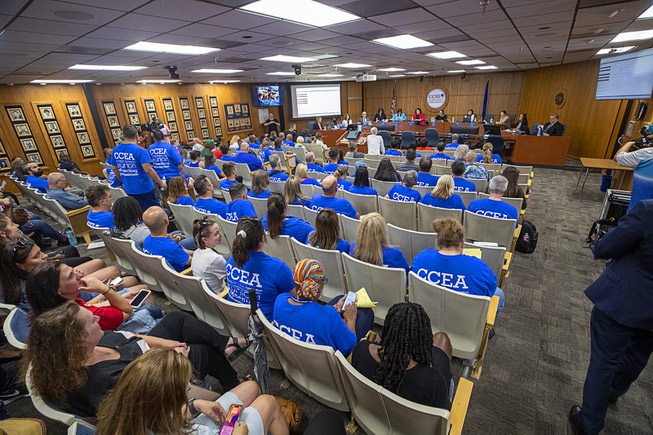
Teachers, wearing blue Clark County Education Association T-shirts, pack a school board meeting at the Clark County School District Education Center on Flamingo Road before a school board meeting Thursday, Aug. 10, 2023. The Clark County School District and the CCEA, the teachers union, are in contract negotiations.
Tuesday, Dec. 5, 2023 | 3:36 p.m.
Both the Clark County School District and the state of Nevada are asking the Clark County District Court to dismiss the teachers’ union lawsuit seeking to void the state law barring strikes by government employees, including teachers.
The district said in a motion filed on Thursday to dismiss the Clark County Education Association’s suit because the case is procedurally flawed: that it is a “collateral attack” or “horizontal appeal” to overturn the existing injunction barring continued teacher work stoppages by filing a new lawsuit within the same court, an example of “blatant judicial gamesmanship” that is barred by doctrine.
“The court should see this case for what it is: a procedurally improper and fatally flawed Hail Mary by a plaintiff desperate to escape the consequences of its actions,” the motion said.
The state, in a motion to dismiss filed on Monday, said that 36 other states in addition to the federal government bar their employees from striking in exchange for collective bargaining rights.
“Granting the relief that the union seeks would not only be an unprecedented departure from settled constitutional law. It would also undermine the Legislature’s careful calibration of public employment in this state. Teachers, police officers, firefighters and publicly employed doctors could be entitled to walk off the job at any time to wring concessions from the helpless public,” the state replied.
CCEA’s suit is part of an ongoing saga between the union and CCSD in their bitter fight over reaching a new teacher contract.
CCEA sued CCSD and the state of Nevada in October, claiming that the injunction against them ran afoul of their rights to free speech and due process, and that the no-strike statutes are vaguely written. The suit came about a month after District Court Judge Crystal Eller issued the injunction after determining that concerted efforts led to large-scale teacher sick calls that closed eight CCSD campuses over seven school days between Sept. 1-13 and disrupted classes for at least two other schools. CCSD had tried unsuccessfully to get an injunction earlier, when it said the union was only credibly threatening a strike.
Eller’s injunction held CCEA liable for the sickouts and blocked the sickouts from continuing. The union sought to have the Nevada Supreme Court stay, or delay, the injunction immediately after it was issued, similarly claiming vagueness and overbreadth. A panel of judges rejected the motion.
Rejecting the motion to stay did not defeat the broader appeal, though. The union filed its opening appeal brief last week to overturn, not just delay, the injunction.
CCSD argued that unless the judge who issued an injunction lacks jurisdiction, the case must be taken next to the appellate courts. Additionally, CCEA should have sought to void the 54-year old no-strike law in a counterclaim to the original injunction suit, or in the existing appeal before the state high court, rather than filing a separate action in district court, the school district said.
On merits, CCSD argued that state and federal courts have consistently upheld state no-strike laws like Nevada’s and rejected arguments like CCEA’s.
“Ironically, CCEA did not lament the statute’s unconstitutionality after avoiding CCSD’s initial request for injunctive relief, despite now claiming that the statute was facially unconstitutional all along,” the district's motion said.
The district also questioned how the union could claim that the no-strike provisions are vague or overbroad, as the terminology keeps its ordinary meanings.
State law defines “strike” to include work stoppages, slowdowns, sickouts and interference with operations.
“CCEA’s apparent contention that Nevada’s public-school teachers are incapable of reasonably understanding the terms ‘concerted,’ ‘stoppage,’ ‘slowdown,’ or ‘interruption,’ is disingenuous and belittling to the thousands of teachers it represents,” the motion said. “These terms do not carry difficult meanings, and CCEA cannot be allowed to feign ignorance over the statute’s otherwise plain requirements in an effort to manufacture a constitutional claim.”
In its motion, the state said that conduct, as opposed to speech, is generally not protected by the First Amendment unless it is “inherently expressive.” If additional “explanatory speech” is necessary then it is not inherently expressive conduct, implying that the sickouts required explanatory speech.
“The antistrike law does not reach protected inherently expressive conduct, so it is not within the First Amendment’s scope,” the motion said. “It bans only actions that interfere with working, like not showing up to work or refusing to work once you are there.”
The state also endorsed all of CCSD’s arguments.
The case is set for a hearing on Jan. 10.
